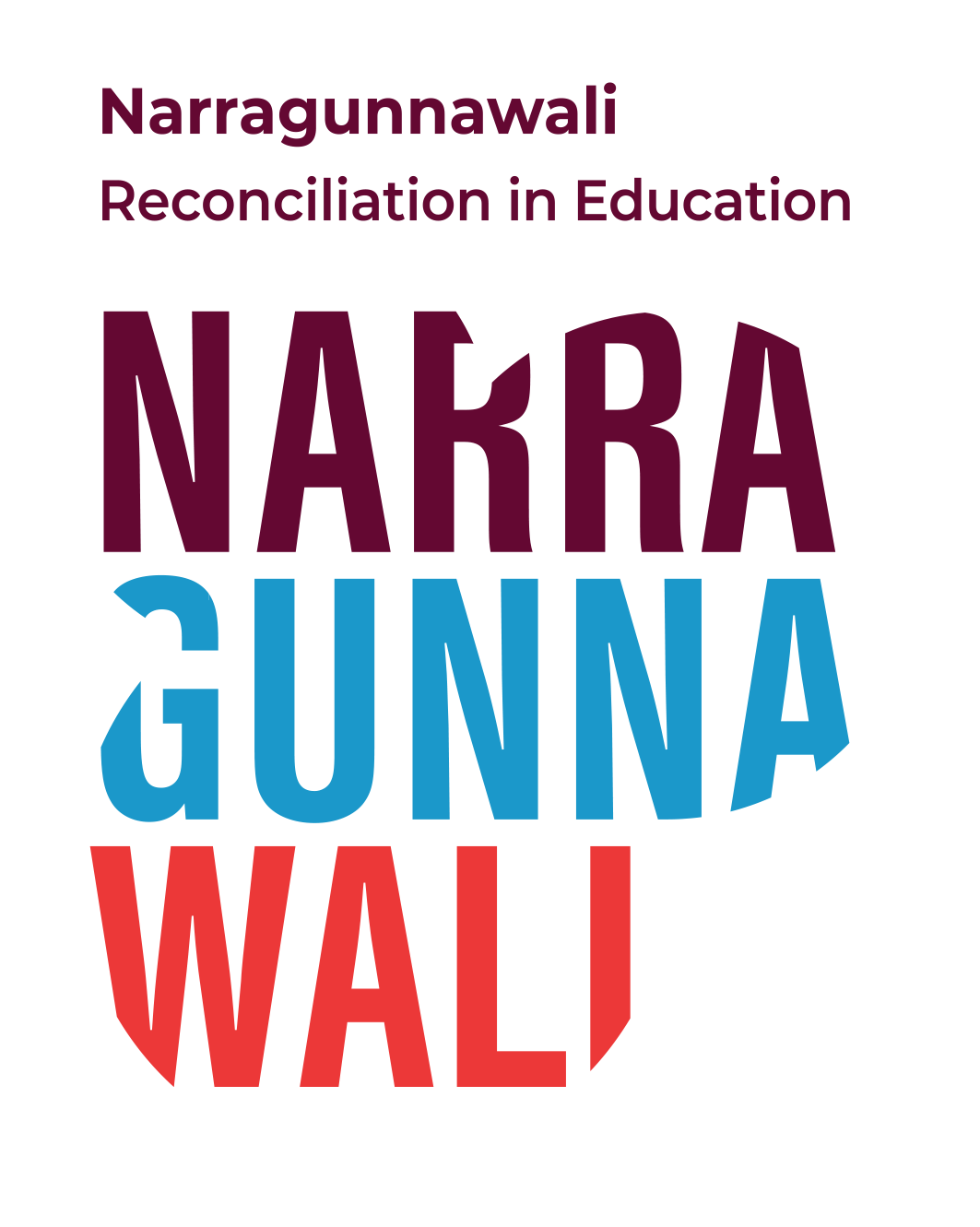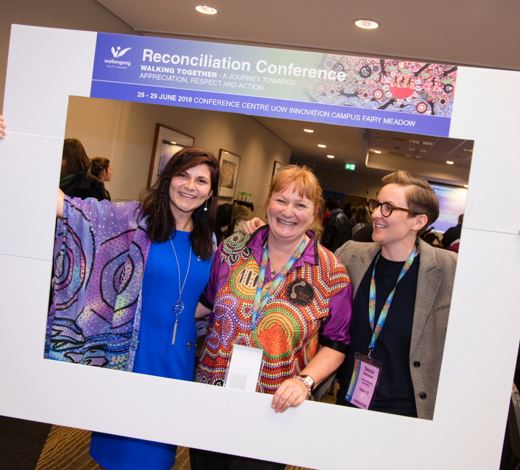Spotlight On – Walking Together Reconciliation Conference, Wollongong NSW
Narragunnawali's Zoe Cassim (Left) and Tessa Keenan (Right) with conference organiser Tracey Kirk-Downey (Middle)
At the end of June 2018, Narragunnawali attended Walking Together: A Journey Towards Appreciation, Respect and Action – a reconciliation conference hosted by Wollongong City Council and a committee of local organisations. The conference was a wonderful example of bringing together the local community. Elders from across Wollongong and the Shoalhaven were invited to each host a table. During a ‘Yarning Circles’ session, Elders shared their stories and journeys with those at their table, and after a period of time, all participants were asked to stand up and move to the next table, to listen to another Elder’s story.
Throughout the conference, educators and early learning support staff participated in conversations, reflections and planning toward collaborative reconciliation initiatives in contextually relevant and responsive ways. There were many thought provoking and inspiring workshops: Academic Jade Kennedy led a workshop on the importance of Country, kinship, culture, journeys and connectedness Aboriginal and Torres Strait Islander peoples share, and Dr Ngiare Brown spoke about the importance of understanding and articulating a Cultural Determinant’s approach to addressing child and adolescent wellbeing and positive intergenerational change.
The conference was energetically driven by Wollongong City Council’s Community Development Worker – Children and Families, Tracey Kirk-Downey, who had been given the opportunity to undertake a 16-month secondment at Cullunghutti Early Learning Service in Nowra, NSW:
“I was the only non–Aboriginal person located in the [Cullunghutti] Family Centre and this is where I learnt many lessons and where I experienced many gifts – cultural gifts… I experienced what it feels like to be the minority in the workplace; I had to quickly try and figure out how to fit in and learn how [my Aboriginal colleagues] worked and communicated with each other and their community. I learnt by watching, listening (with both my ears and my heart) and asking questions... I did, however, make some mistakes with the consultation process and I tried really hard to learn from those. My biggest lesson was that I can’t go my usual hundred miles an hour when working with our Aboriginal Community – relationships are key and they take time.”
Upon returning to her role at Council, Tracey was encouraged by both the Council’s Board and her colleague and mentor, Aunty Lyn from Cullunghutti, to reflect on how she could draw on learnings and inspiration from her experiences at Cullunghutti to support reconciliation across the Wollongong area. This lead to the idea of coordinating the Council’s first ever reconciliation conference.
Tracey explained that the key to the conference’s success stemmed from both the facilitators’ and participants’ willingness to “speak their truth about where they felt least confident; their fears around making a mistake; what road blocks existed for them and what they wanted to know more about.” Sessions like the Yarning Circles provided opportunities to listen, which were fundamental to making the conference a memorable and meaningful two days.
Historical acceptance is one of the five integral and interrelated dimensions of reconciliation in Australia, and providing appropriate opportunities for Elders and Traditional Owners to Share Histories and Cultures is indeed one of the suggested Actions that schools and early learning services can commit to as part of their Reconciliation Action Plan (RAP) development, so it was great to see both of these actively reflected in the conference conversations and activities. Tracey also expressed how the three key pillars of the RAP framework – relationships, respect and opportunities – were key to making the conference happen, and making it happen successfully:
“Strong, respectful relationships are the reason I was able to get twenty-four Elders to attend our Reconciliation Conference and participate in the yarning circle session. Relationships and respect have given me the opportunities to develop lasting friendships and the courage to continue on my reconciliation journey and to bring as many people along with me as possible.”
With this year’s NAIDOC theme being Because of HER, we can! two such friendships came to Tracey’s mind when asked who inspired her personal and professional journey of reconciliation in education: Aunty Lyn and Aunty Grace from Cullunghutti:
“These are two women who have inspired me – they both have an incredible passion for their community, the early childhood sector and education, and are both extremely generous with their time, care and willingness to share their knowledge with me and their community”.
For schools and early learning services looking to develop their own reconciliation projects and networks, with a similarly personalised and localised focus, some learnings from the Walking Together Wollongong Council Reconciliation Conference and words of advice from Tracey include:
“Show up, show up, show up!” – Attending appropriate local community events and celebrations can be a great way to meet people, develop relationships, and offer support for future collaborative events.
“Take the first step!” – Be passionate enough to commit to making a change and introduce yourself to local Elders and community members. Remember that reconciliation is everyone’s business.
“Listen more and talk less when engaging with Elders!” – It’s not about rushing in with requests and already having an answer for them before you ask. It’s about taking turns and making turns for sharing of stories and experiences.
“Jump in and have fun!” – According to Tracey, “working with your local Aboriginal community is incredibly humbling and rewarding… It has changed my life; it has changed me; and I have a whole lot more people that I will be connected to for life, and who will be etched into my heart and soul forever. Take the plunge and go head first – you won’t regret it!”


